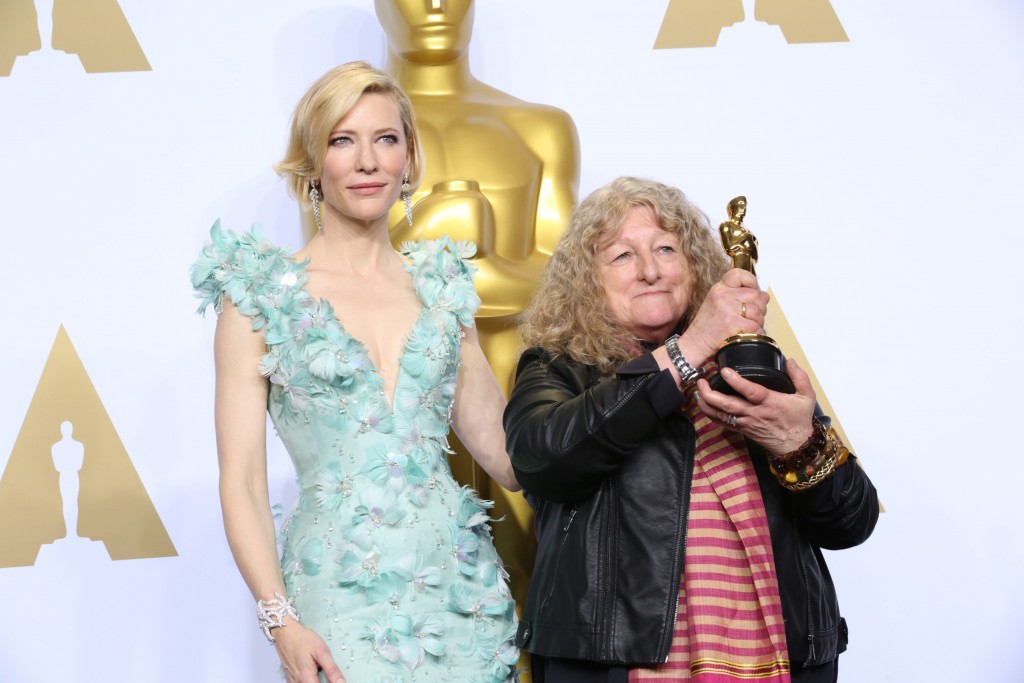
Cate Blanchett (L), who was nominated for Best Actress for Carol, and Jenny Beavan (R), who won the prize for Best Achievement in Costume Design for Mad Max: Fury Road
AMONG ALL OF THE DISCUSSION ABOUT #OSCARSSOWHITE, the fact that the Oscars are still, as they always have been, so very male was left out of the conversation. Hardly surprising when men make up nearly three-quarters of the Academy’s members – men are simply more likely to respond to works by and about other men. There’s a reason so many women win acting Oscars for playing supportive wives and mothers who help men through difficult times – Patricia Arquette in Boyhood last year and Alicia Vikander in The Danish Girl this year come to mind. There’s also a reason why there have been eight women directors who have been snubbed, despite steering their movies to Best Picture nominations. In fact, this year’s winner for Best Director, Alejandro G. Inarritu, has won as many Oscar statues in two years (he won three for Birdman and one for The Revenant) as there have been women nominated for the Best Director prize in 88 years. An appalling statistic — not least of which is because his movies are not good.
Despite all of this, the 2016 Oscars ceremony actually featured a healthy amount of women winners. We can predominantly thank the gonzo action extravaganza of Mad Max: Fury Road. But that doesn’t make the wins of these six in particular any less extraordinary. We should all learn their names and hope that they continue to find success in this male-dominated industry.
Sharmeen Obaid-Chinoy – Best Documentary Short, A Girl in the River: The Price of Forgiveness
This Pakistani filmmaker, journalist, and activist has now won two Academy Awards for her documentary shorts. Her first win was in 2013 for Saving Face, about the struggle for justice by two women attacked by acid. With A Girl in the River: The Price of Forgiveness, Obaid-Chinoy turns her lens onto her country’s shocking plague of honor killings, and the disturbing normalcy with which these crimes are handled by the country’s criminal and legal professions. During her speech, the filmmaker claimed Pakistani Prime Minister Nawaz Sharif had seen the film and is going to change the laws surrounding honor killings.
A Girl in the River: The Price of Forgiveness can be seen on HBO platforms.
Margaret Sixel – Best Achievement in Film Editing, Mad Max: Fury Road
The world of film editing isn’t quite as macho as, say, cinematography – no woman has ever been nominated for a cinematography Oscar, the last technical category with such a statistic. It says a lot about our gendered way of thinking that many were surprised to discover a movie as propulsive and full-throttle as Mad Max: Fury Road was edited by a woman. But when director George Miller felt he needed a fresh set of eyes on the project, somebody whom he could trust to help turn his footage into something nobody has ever seen before, he turned to his wife, Margaret Sixel. Having previously worked almost exclusively on documentaries and television in Australia, Sixel’s mammoth achievement was not just a breakthrough for her, but a breakthrough for the category. Sixel was nominated alongside Maryann Brandon and Mary Jo Markey, who were recognized for their work on Star Wars: The Force Awakens.
Mad Max: Fury Road is available to stream on HBO Go.
Jenny Beavan – Best Achievement in Costume Design, Mad Max: Fury Road
We’re used to seeing women on stage accepting trophies for costume design. Edith Head, for instance, has won the most ever with eight, in a streak running from 1949’s The Heiress to 1973’s The Sting. Beavan is known predominantly for her work on stately British period pieces like Howard’s End, The King’s Speech, and A Room with a View (for which she won her first Academy Award in 1988). She won her second golden statue by tackling the post-apocalyptic oil-stained rags, desert-weathered war boy uniforms and pus-filled breast-plates of Mad Max: Fury Road. It makes for a quite unlikely winner. Unlikely, too, was what she wore to the ceremony – a (faux) leather jacket with Swarovski jewels in the shape of a skull and flames on the back. A lot of fuss was made over the apparent lack of clapping by some of the men in the audience, but in the end it was Beavan that came out on top, and she deserves the gold.
Sara Bennett – Best Achievement in Visual Effects, Ex Machina
The win by British indie Ex Machina in the category that is usually reserved for the biggest and the shiniest of America blockbusters was not only the biggest surprise of the night – much more of a shock than Sylvester Stallone’s loss to British Broadway star Mark Rylance – but also one of the biggest surprises in the category’s history. Movies this small, where effects are used relatively sparingly, simply are not meant to win, especially when nominated against Best Picture nominees like Mad Max: Fury Road, The Martian, and The Revenant. Adding further bliss to the win was Sara Bennett, only the third-ever nominee for a Visual Effects Oscar and only the second woman to ever win. The first winner was Suzanne M. Benson for Aliens in 1987; the only other female nominee was Pamela Easley in 1994 for her work on Cliffhanger. Bennett is the co-founder of visual effects production company, Milk, already an extremely rare distinction, and has spoken of her desire to make her company a diverse one. Her win makes her the first visual effects supervisor to win.
Ex Machina is available now on home entertainment.
Nicole Rocklin and Blye Pagon Faust – Best Picture, Spotlight
The first woman to ever win an Oscar for Best Picture was Julia Phillips in 1974 for The Sting. Since then, only nine other women have followed in her groundbreaking footsteps, two of which came in 2016 with the win for Spotlight, a drama about a group of journalists attempting to break the news of Catholic sexual abuse in Boston. No woman has ever won Oscar’s top prize solo (although plenty of men have, naturally). For those into Hollywood dirt, Julia Phillips wrote a memoir entitled You’ll Never Eat Lunch in This Town Again, which is supposed to be fabulous read.
Spotlight is still playing in cinemas, and is also out on home entertainment.
As with every other category we’ve discussed – as well as those we haven’t – hopefully the more people’s misconceptions about women filmmakers are changed, the more likely it will be that we no longer have to write articles like this. Until then, let’s celebrate these six women as well, as all of the nominees and other winners:
- Brie Larson — Best Actress, Room
- Alicia Vikander — Best Supporting Actress, The Danish Girl
- Lesley Vanderwalt and Elka Wardega — Best Achievement in Makeup and Hairstyling, Mad Max: Fury Road
- Lisa Thompson — Best Achievement in Production Design, Mad Max: Fury Road
- Serena Armitage — Best Live Action Short, Stutterer
- Gena Rowlands and Debbie Reynolds, who took home honorary Oscars for their acting and charity achievements respectively.
Here’s to seeing more women, whether they’re on-screen or behind-the-scene, being recognized and celebrated for their contributions to the film industry.
















